
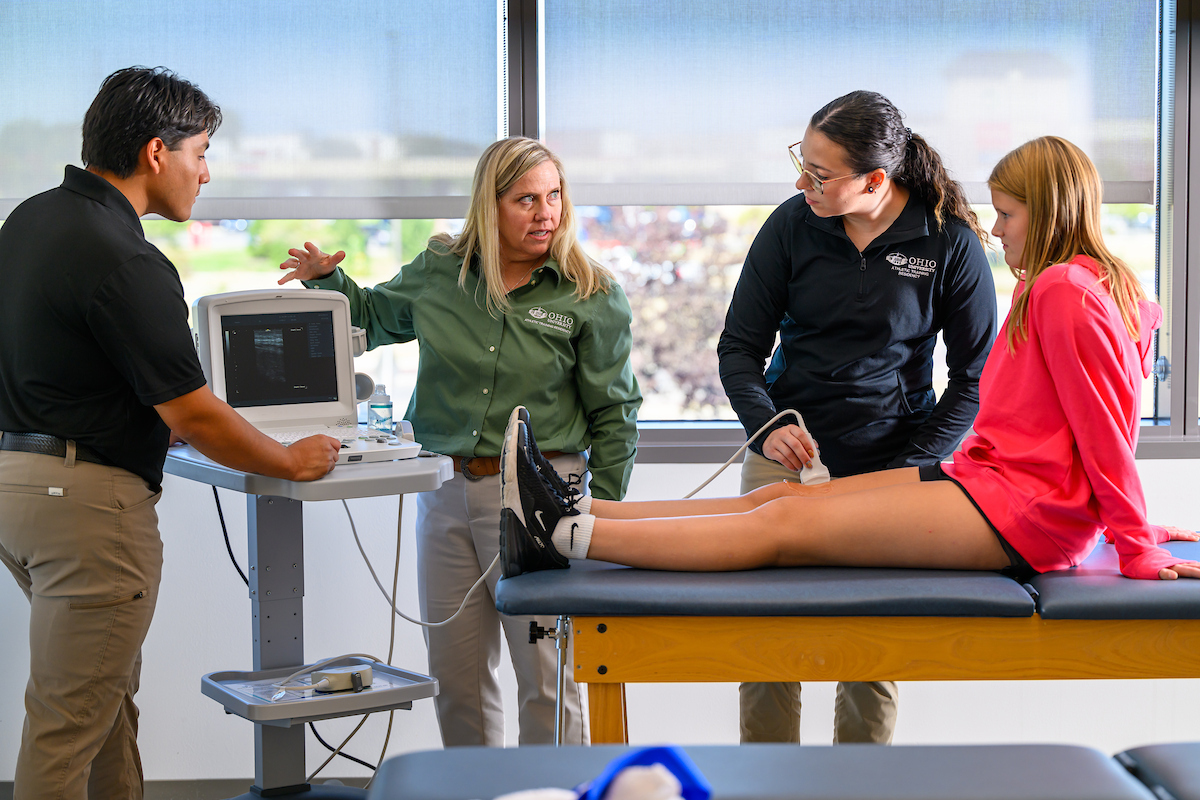
Ohio University and OhioHealth launch nation’s first accredited athletic training residency in pediatrics
Licensed athletic trainers now have a more direct path to pediatric expertise through the Ohio University, OhioHealth residency program.
September 15, 2025
Share:
Ohio University’s College of Health Sciences and Professions (CHSP) has partnered with OhioHealth Sports Medicine to create the nation’s first accredited athletic training residency specializing in pediatrics.
“The Athletic Training Program at Ohio University has been innovating and helping to grow professionals in the field for over 50 years,” said John McCarthy, dean of the College of Health Sciences and Professions. “By designing this specialized residency intentionally, OHIO and OhioHealth are continuing this legacy of leadership by ensuring that graduates are ready to make a meaningful difference in the performance, health, and development of athletes from day one, minute one."
Pediatric athletic training residency at Ohio University for early-career athletic trainers
The first-of-its-kind pediatric athletic training residency program is designed for licensed athletic trainers beginning their careers and seeking to expand their expertise in caring for pediatric and adolescent athletes. The 12-month program, accredited by the Commission on Accreditation for Athletic Training Education (CAATE), is based at Ohio University’s Dublin Integrated Education Center and combines clinical practice with graduate-level coursework totaling 17 credit hours.
“This program is a transition-to-practice route for newly credentialed ATs, assisting young professionals to more easily make the jump from new graduate to independent practice. Many new graduates often experience ‘Imposter syndrome,” said Chad Starkey, department of athletic training chair. “The mentored relationship between a more experienced AT, the affiliated residency, and the student, combined with the required coursework, helps the new AT refine their knowledge and skills working with the largest athletic population, and one of the most underserved nationally, pediatric athletes.”
Residents complete coursework covering administration, policy development, psychology, anatomy, evidence-based medicine, and manual therapy. A pediatric focus is embedded throughout the curriculum, preparing athletic trainers for work in middle schools, high schools, and youth sports programs.
A signature component of the program is a full-semester course in human cadaver anatomy, taught by a faculty anatomist with more than 25 years of teaching experience. Additional training includes phlebotomy, injection administration, and EKG procedures.
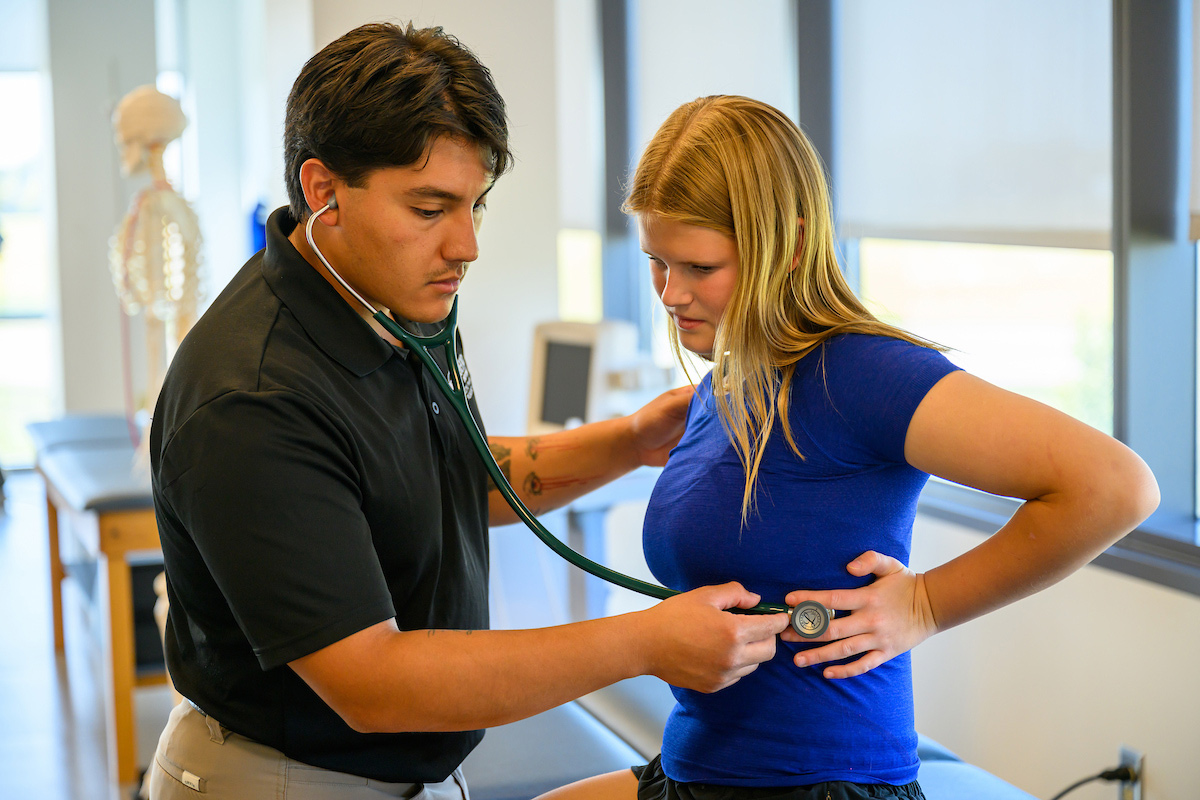
OHIO's Pediatric Athletic Training Residency helps new athletic trainers gain experience, build independence, and develop advanced skills for treating young athletes.
Why the rise in youth sports increases the need for pediatric athletic trainers
In 2023, participation in youth sports among children ages 6 to 17 reached its highest level since 2015, with roughly 54% nationally and a slightly higher rate of 57.9% in Ohio, according to the Aspen Institute’s Project Play 2024 State of Play report. As youth sports grow, so does the demand for specialized care for young athletes.
Athletic trainers have long been essential in high school, collegiate athletics, professional sports, performing arts, the military, and industrial settings, providing injury prevention, emergency care, diagnosis, and rehabilitation. Today’s youth sports industry is shifting, with record-level participation in club teams, travel leagues, and recreational programs, and more girls and young women competing than ever before.
This growth brings new challenges. Overuse injuries are increasing, fueled by sports specialization, when children commit to a single sport and train year-round. Many play on overlapping school and club teams, leaving little time for rest, recovery, or cross-training. The repetitive strain of constant practices, games, and tournaments raises the risk of injury and can lead to emotional burnout.
Pediatric athletic trainers address these challenges. They understand the pathologies unique to pediatric athletes and the physical and developmental differences between children, adolescents, and adults, adapting training, conditioning, and recovery strategies. They identify early signs of acute and overuse injuries, coordinate care with physicians and coaches, and ensure young athletes return to play safely, protecting the long-term athletic potential of youth athletes.
Nobody wants to do the GA model because students don’t want a second master’s degree.
Why OHIO’s residency is a solution for athletic trainers interested in youth athletics
For recent and upcoming athletic training graduates, gaining post-graduate certification has become more challenging. Traditionally, newly credentialed athletic trainers gained mentorship and hands-on experience through graduate assistantships. With the profession now requiring a master’s as the entry-level degree, pursuing a graduate assistantship (GA) typically means earning a second master’s, which is not always ideal.
“Nobody wants to do the GA model because students don’t want a second master’s degree,” explained Dr. Laura Harris, Athletic Training Residency Director. “Prior to the elimination of the baccalaureate degree in athletic training, the GA model was where athletic trainers would gain experience by going to work for a large university for two years as a graduate assistant, and so they would get that kind of mentored residency-type training while earning a master’s degree.”
The one-year Ohio University Athletic Training Residency in Pediatrics addresses this issue, enabling new athletic trainers to gain the experience and knowledge they need to enter the field and practice independently sooner while also learning advanced skills to treat an adolescent population.
“Dr. Harris’ vision for this program is truly revolutionary. Historically, residency programs have been hospital or clinic-based. This program combines the academic expertise of Dr. Harris and other AT faculty with the clinical expertise of OhioHealth residency-affiliate faculty members, facilities, and network,” said Starkey. “This model will be adopted by other institutions. A dean from another university called to check on how we modeled this, and he declared that this approach is a 'game changer.”
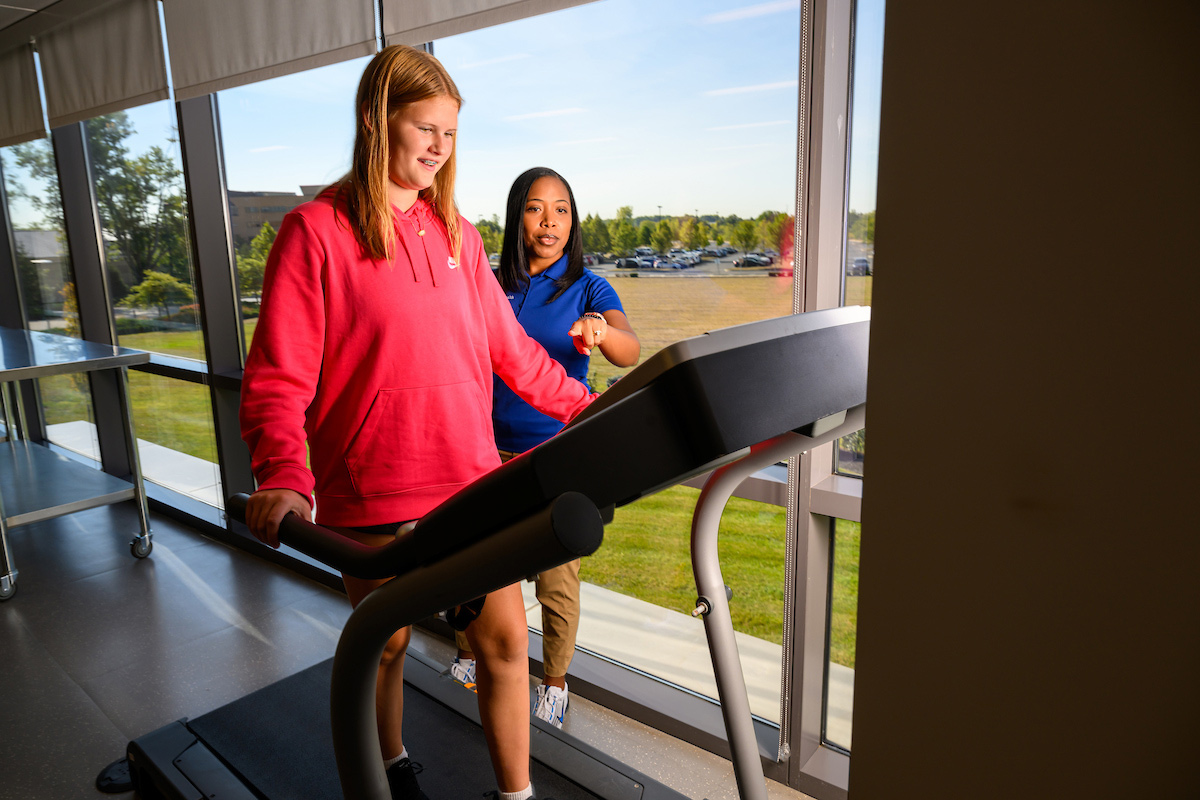
The pediatric athletic training program at OHIO’s Dublin campus trains new athletic trainers to support adolescent athletes’ recovery and safely manage growing bodies.
Why mentorship opportunities help early-career athletic trainers succeed
Isolation is a common concern for new athletic trainers, particularly in secondary education settings. OHIO’s residents complete a minimum of 500 hours of mentored clinical practice, guided by experienced athletic trainers working directly with pediatric and adolescent patients. This supports the transition from recent graduate to practicing clinician, helping residents develop both technical skills and professional confidence.
“Education leads to learned ignorance, meaning that the more the student learns, the more they understand what they do not know. This often leads to the person second-guessing their decision or unclear of the best approach to resolving the athlete’s problem,” said Starkey.
“In the classroom, Dr. Harris and her colleagues help reinforce their baseline knowledge while the OhioHealth affiliate faculty help the residents apply that knowledge. The secondary-school setting is also unique as the patients are often under the age of 18, adding another layer – the parent(s) - to the equation. The expertise and experience of the affiliate faculty helps the resident navigate through this.”
The residency faculty includes three core teaching faculty members whose work has earned more than 10 state, district, and national awards for teaching, mentorship, and professional service. They are joined by more than 15 residency-affiliate faculty members who work clinically with residents and bring over 100 years of combined athletic training experience.
Residents are also required to design and present a project at the Ohio Athletic Trainers’ Association Annual Meeting and Clinical Symposium, contributing to the profession’s ongoing development and sharing innovations in pediatric care.
Addressing career burnout through Ohio University’s athletic training residency in pediatrics
Lack of mentorship and support is a major contributor to burnout, particularly in high school settings. Harris describes the feelings of new athletic trainers:
“Burnout’s going to come on pretty quickly when you start to go home every day and feel like ‘I don’t know if I’m making a difference’ or ‘I don’t know if I’m good at this. I seem to be struggling.’”
Residency programs provide structured mentorship and advanced coursework, offering a direct path to professional confidence and skill. Alumni “feel like they’re two or three years ahead of their peers that are the same age because of that advanced coursework that they’re taking, as well as the mentorship along the way,” Harris said.
This post-professional training is essential for longevity and success, particularly in demanding and isolated high school settings.
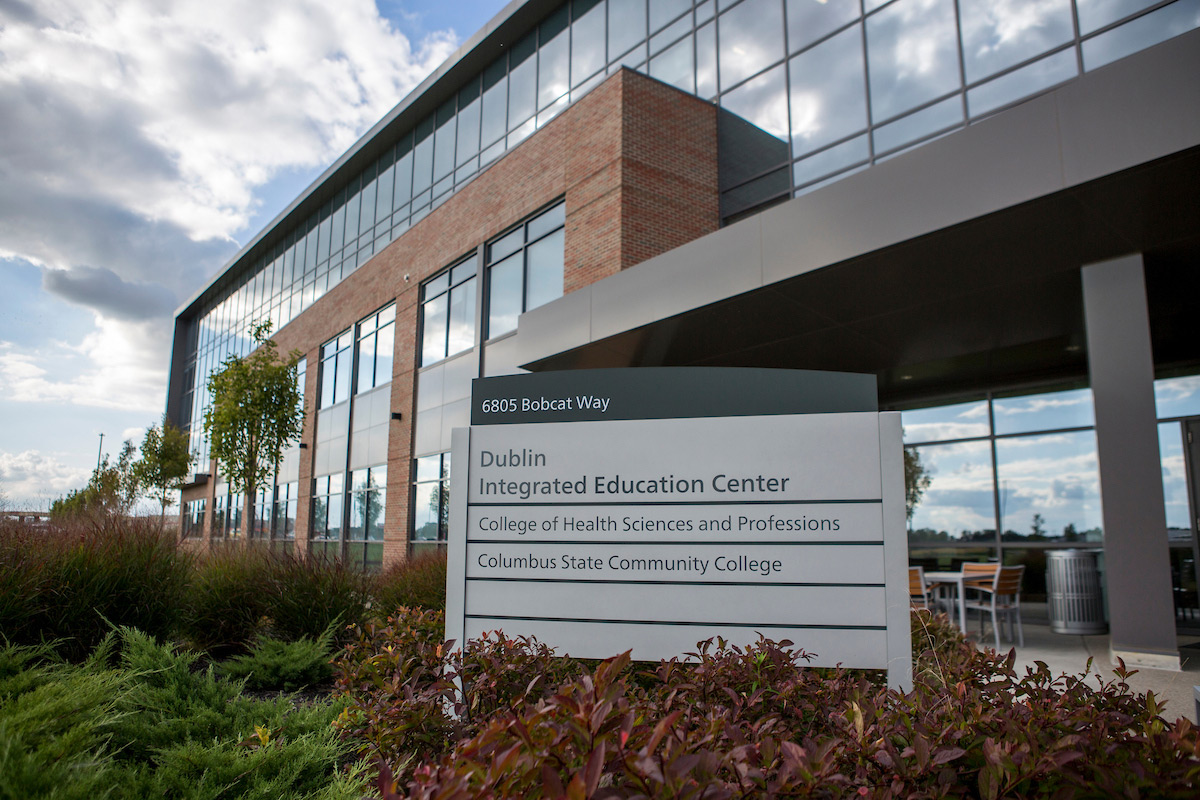
OHIO's Dublin Integrated Education Center provides modern classrooms and labs, supporting advanced learning, hands-on training, and collaborative experiences.
What professional benefits and academic opportunities do residents in Ohio University’s pediatric athletic training program receive?
The residency provides a comprehensive compensation and benefits package to support residents professionally and personally. Residents receive competitive pay and are eligible for medical and health benefits, retirement options, and flexible or health savings accounts. Professional development is further supported through tuition reimbursement eligibility and funding for continuing education.
Residents also earn 17 credit hours of graduate-level coursework that can be applied toward Ohio University’s online Doctor of Athletic Training, leaving just 24 credit hours remaining to complete the doctoral degree. This integration of mentorship, academic rigor, and practical experience reflects the program’s commitment to developing highly skilled athletic trainers equipped to meet the unique needs of pediatric athletes.
Why the Ohio University, OhioHealth partnership is ideal for pediatric athletic training residency education
In developing the residency, Ohio University and OhioHealth Sports Medicine intentionally combined their strengths. OhioHealth, one of the largest medical centers in the state, employs more than 100 athletic trainers, offers a broad network of clinical placements, and provides access to best practices in adolescent and youth sports medicine.
“OhioHealth’s expansive network of community partners affords opportunities to work with young athletes at all levels in a variety of sports and disciplines,” said Director of Sports Medicine at OhioHealth Katrina Stibel. “With the experiential learning and mentorship that is offered, the takeaways will be life lessons carried with them far beyond the program.”
In addition to hands-on training, residents gain exposure to the broader systems that support athletic trainers and the athletes they serve.
“This opportunity introduces young professionals to navigating the healthcare system creating seamless experiences for athletes and their families,” said Christopher Hite, Manager, OhioHealth Sports Medicine. “The affiliate faculty ATs employed by OhioHealth have decades of experience working in secondary schools.”
Ohio University brings a long history in post-professional athletic training education, delivering academic infrastructure, research integration, and specialized teaching expertise that ensures the residency curriculum stays aligned with the latest advancements. The Dublin Integrated Education Center offers modern classroom and laboratory facilities, creating an ideal environment for advanced learning and collaboration. Residents also benefit from OhioHealth’s extensive resources, including its network of clinical mentors and diverse patient populations.
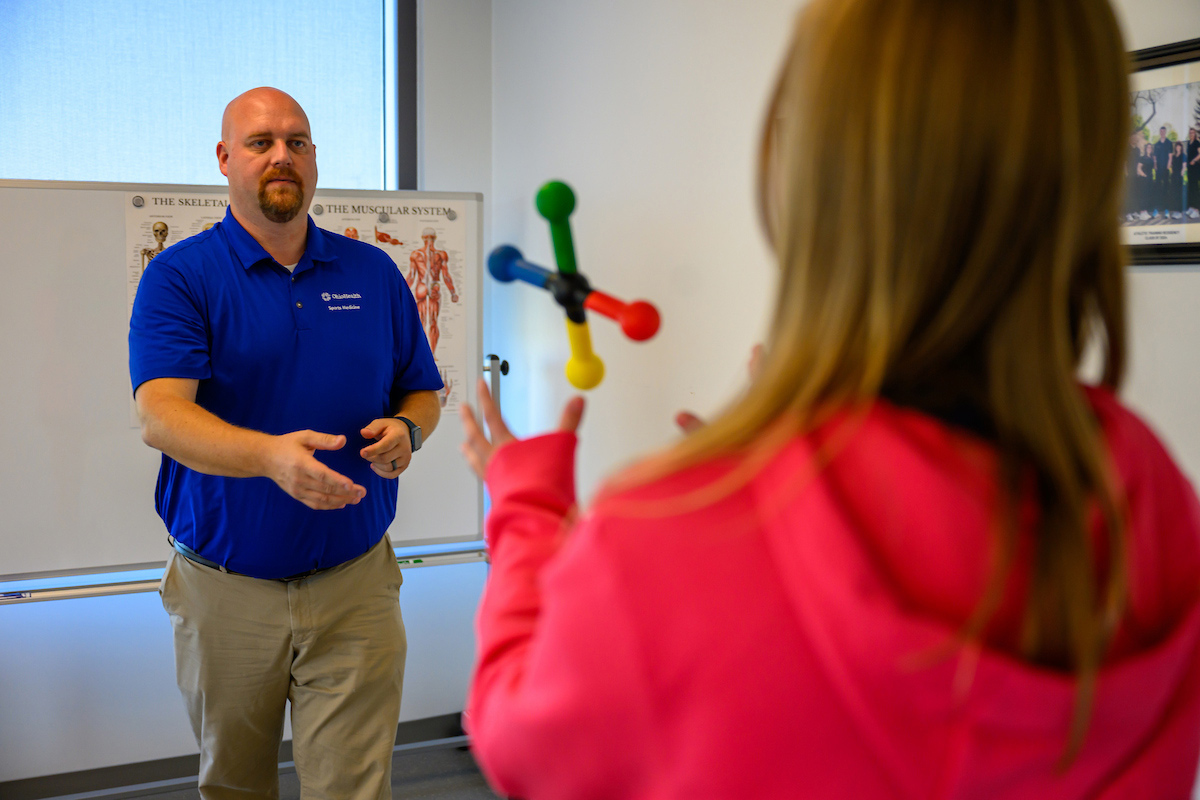
OHIO's pediatric athletic training residency program helps ATs support adolescent athletes’ recovery, coordination, and overall wellness.
Learn More About OHIO’s pediatric athletic training residency
Ohio University’s pediatric athletic training residency offers early-career athletic trainers a unique opportunity to gain specialized skills, hands-on experience, and academic credit toward a doctoral degree. Explore how this program can help you advance your expertise in pediatric sports medicine and make a meaningful impact on the health and safety of young athletes.


